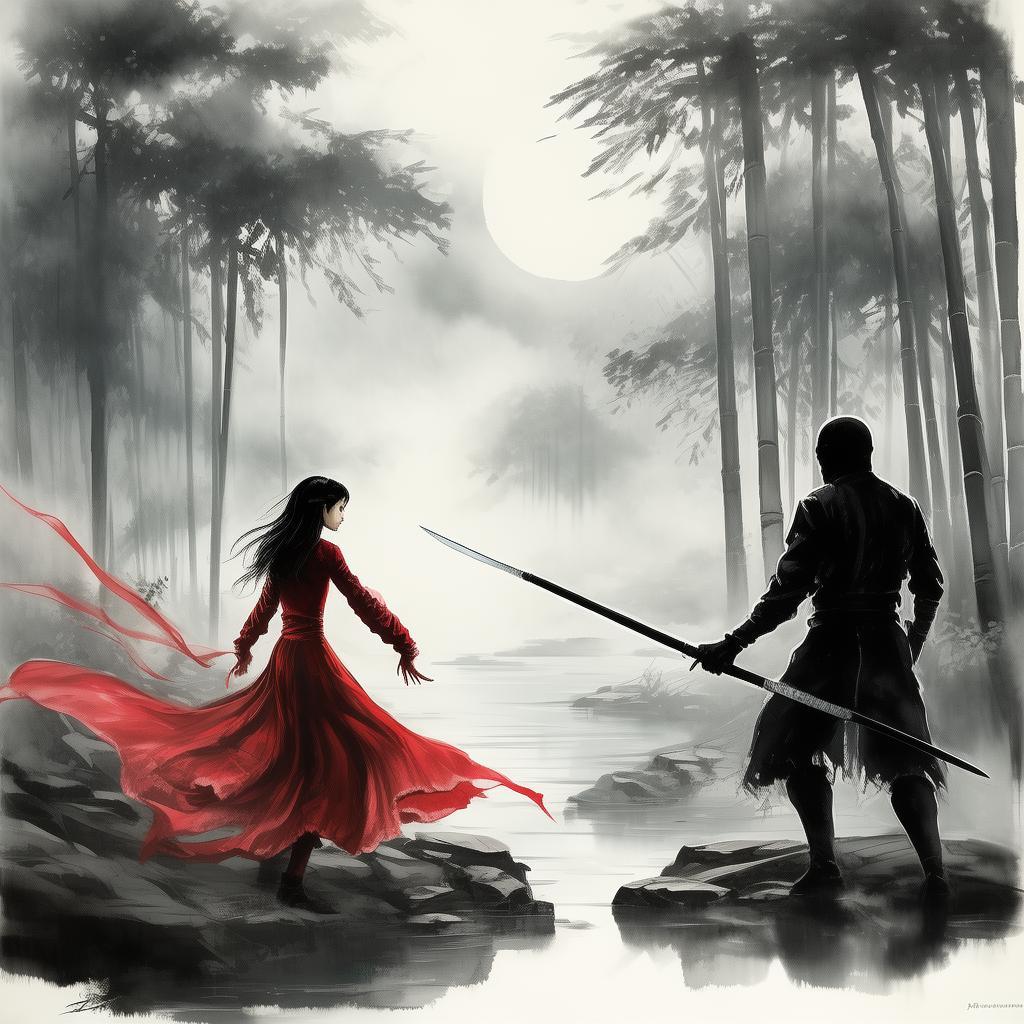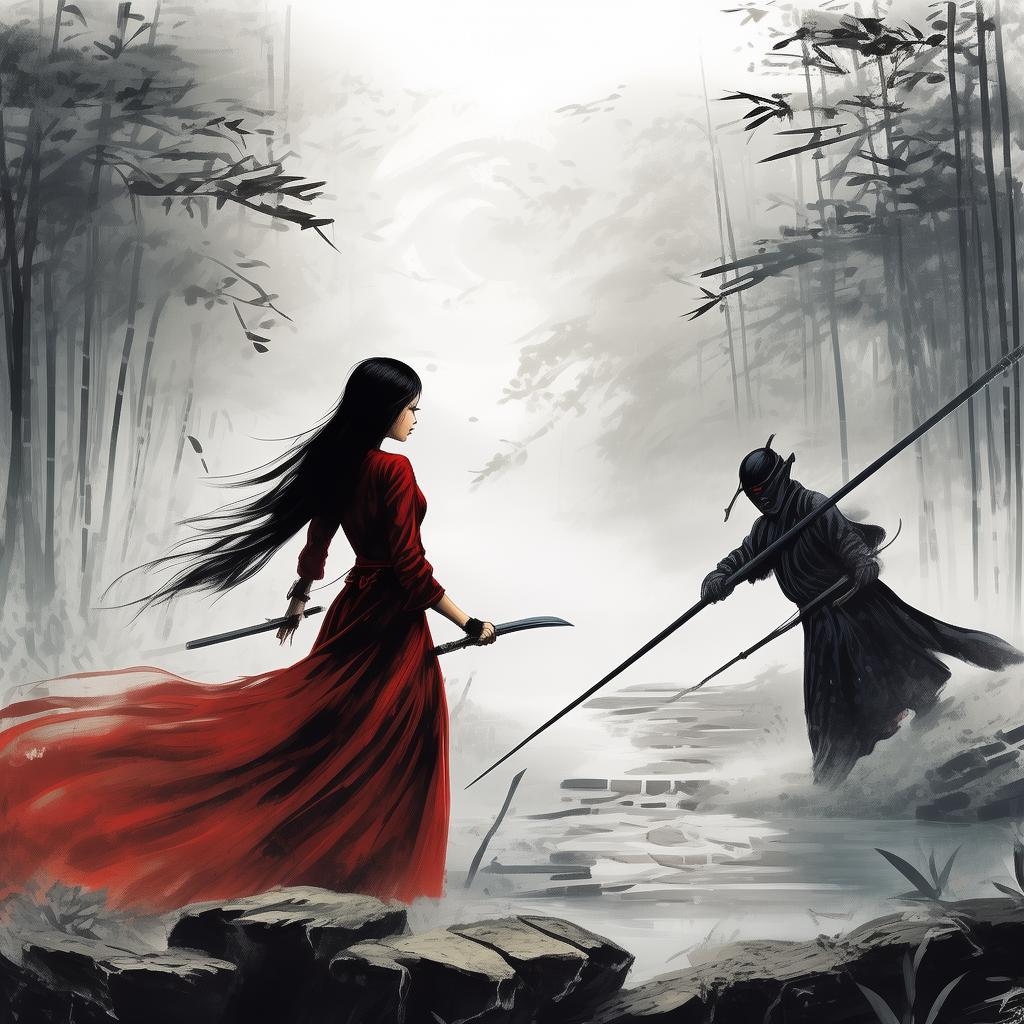Shadow of the Moon: A Lament for the Lost Martial Arts
In the shadowed valleys of ancient China, where the whispers of forgotten warriors lingered in the winds, there lived a man named Ming. Once a renowned martial artist, he had basked in the glow of his master's wisdom and the respect of his peers. But time had taken its toll, and Ming found himself without a master, without a school, and without his former glory. The title of "Shadow of the Moon" was not one of honor but of solitude, a name that followed him like a ghostly shadow.
The night of the solstice, as the moon hung full and round in the sky, Ming found himself wandering the ancient city of Chang'an. The streets were silent, save for the occasional creak of a wooden door or the distant call of a street vendor. Ming's eyes, though old, still held the fire of a man who had once danced with death and emerged unscathed. Yet, something was missing, a void that no amount of practice could fill.
It was then that he noticed the flicker of light in an alleyway. Ming, the Shadow of the Moon, had spent a lifetime avoiding the light, but tonight, driven by an unnamable urge, he stepped into the darkness. There, amidst the shadows, was a small, unassuming door. It was not a grand temple or a famous school, but the door to the old martial arts master, who had been said to have vanished without a trace.
Ming knocked, and the door creaked open, revealing an old man with a long, grizzled beard and eyes that seemed to pierce through the darkness. "Who seeks the wisdom of the old master?" the man's voice was deep, almost a rumble.
"I am Ming," he replied, "the Shadow of the Moon. I seek not just wisdom but understanding. My art is lost, and I need to reclaim it."
The old man's eyes softened, and he stepped aside, allowing Ming to enter a dimly lit room filled with ancient scrolls and forgotten artifacts. "Many have sought what you seek, but few have found it," he said, "for the art of the martial arts is not just in the physical movements but in the heart and soul."
Ming nodded, understanding the old man's words but feeling a deeper emptiness within himself. The old man led him to a corner of the room where a single, ancient scroll lay on a wooden stand. "This," he said, "is the legacy of the lost martial arts. It has been hidden for generations, waiting for someone who truly deserves it."
Ming approached the scroll, his fingers trembling as he touched the worn parchment. The old man spoke, "The true martial artist is one who seeks harmony, not dominance. They use their art to heal, not to harm. The lost martial arts are a balance, a path that requires both strength and compassion."
As Ming read the scroll, the words seemed to come alive, weaving a tapestry of forgotten techniques and ancient wisdom. But as he delved deeper, he realized that the true secret of the lost martial arts was not in the physical techniques, but in the spirit of the warrior. It was a path of humility and service, one that he had long since abandoned in his quest for mastery.
The old man, sensing Ming's confusion, said, "The path of the lost martial arts is not one of power but of purpose. It is a journey to find yourself, to understand your place in the world, and to use your skills for the greater good."

Ming's heart swelled with a newfound purpose. He realized that his true battle was not with external foes but with his own pride and desire for recognition. The lost martial arts were a chance to start anew, to become not just a master of the physical form, but a master of the spirit.
As the night wore on, Ming sat with the old master, learning not just the physical techniques but the philosophy that underpinned them. He discovered that the true strength of a martial artist lay not in the power of their punches or the sharpness of their blades, but in the courage to face their own weaknesses and the compassion to help others.
In the days that followed, Ming practiced with a new determination. He sought out those in need, offering his skills not as a means to dominance but as a tool for healing and peace. His reputation grew, not as a warrior of might but as a guardian of the spirit.
But the old master, ever the enigma, had left Ming with one final piece of wisdom. "The true legacy of the lost martial arts," he said, "is not in the techniques or the teachings, but in the way you live your life. The path is not a destination but a journey, one that continues as long as you draw breath."
Ming left Chang'an with a heart full of gratitude and a mind full of purpose. The title of "Shadow of the Moon" no longer fit him. He had become the Moonlight Guardian, a martial artist who walked in the light, using his skills to illuminate the path for others.
And so, the story of Ming, the Shadow of the Moon, turned into a tale of transformation, of a man who found his true purpose in the world, and whose legacy would live on long after his physical form had returned to the earth.
✨ Original Statement ✨
All articles published on this website (including but not limited to text, images, videos, and other content) are original or authorized for reposting and are protected by relevant laws. Without the explicit written permission of this website, no individual or organization may copy, modify, repost, or use the content for commercial purposes.
If you need to quote or cooperate, please contact this site for authorization. We reserve the right to pursue legal responsibility for any unauthorized use.
Hereby declared.









